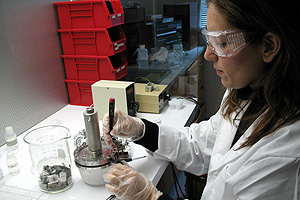 Chelsey Juarez is a doctoral student in forensic anthropology at UC Santa Cruz. She is developing a database of soil profiles that would help identify the bodies of migrants who die crossing the U.S.-Mexico border. To develop her database, she has been analyzing teeth. Our teeth contain information that shows what kind of soil we grew up in, and thus, where we come from. Juarez has obtained these teeth through Northern California dental clinics that work with migrants. Borrowing from archaeology techniques, Juarez is creating soil profiles of the Mexican regions that most migrants from the country hail from (the states of Jalisco, Michoacan, Guanajuato, Veracruz and Oaxaca). This way, when authorities discover a body in the desert, they will be able to determine what region the person came from and, through the local Mexican media and consular personnel in that region, alert the public and hopefully reunite a family with their loved one’s remains. Juarez has a personal interest in seeing this method developed. Her father crossed the border 30 years ago. Though he survived, border deaths have been steadily increasing since the crackdown on the Tijuana/San Diego border following 9/11. In 2005, 463 bodies were discovered along the border.
Chelsey Juarez is a doctoral student in forensic anthropology at UC Santa Cruz. She is developing a database of soil profiles that would help identify the bodies of migrants who die crossing the U.S.-Mexico border. To develop her database, she has been analyzing teeth. Our teeth contain information that shows what kind of soil we grew up in, and thus, where we come from. Juarez has obtained these teeth through Northern California dental clinics that work with migrants. Borrowing from archaeology techniques, Juarez is creating soil profiles of the Mexican regions that most migrants from the country hail from (the states of Jalisco, Michoacan, Guanajuato, Veracruz and Oaxaca). This way, when authorities discover a body in the desert, they will be able to determine what region the person came from and, through the local Mexican media and consular personnel in that region, alert the public and hopefully reunite a family with their loved one’s remains. Juarez has a personal interest in seeing this method developed. Her father crossed the border 30 years ago. Though he survived, border deaths have been steadily increasing since the crackdown on the Tijuana/San Diego border following 9/11. In 2005, 463 bodies were discovered along the border.
"San Francisco Bay Debris and Plug-In Hybrids" (episode #102) which includes the short segment above, airs tonight on QUEST at 7:30pm on KQED 9, and KQED HD, Comcast 709. (full schedule)
You may also view the entire Forensic Identification segment online. Extra web-only footage is also available.
Gabriela Quirós is a Segment Producer for KQED-TV, and is the producer for this segment.